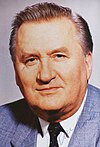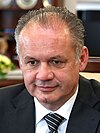President of Slovakia
| President of the Slovak Republic | |
|---|---|
| Prezident Slovenskej republiky | |
 Presidential standard | |
since 15 June 2024 | |
| Style |
|
| Type | Head of state |
| Residence | Grassalkovich Palace, Old Town, Bratislava |
| Appointer | Popular vote |
| Term length | Five years, renewable once consecutively |
| Formation | Constitution of Slovakia |
| First holder | Michal Kováč 2 March 1993 |
| Succession | Line of succession |
| Salary | c. 204,000 € per annum[1] (2024) Pension for former presidents: c. 48,000 € per annum[1] |
| Website | www |
 |
|---|
The president of the Slovak Republic (Slovak: Prezident Slovenskej republiky) serves as the head of state of Slovakia and commander-in-chief of the Armed Forces. The people directly elect the president for five years, for a maximum of two consecutive terms. The presidency is essentially a ceremonial office, but the president exercises certain limited powers with absolute discretion. Their official residence is the Grassalkovich Palace in Bratislava.
History
[edit]The office was established by the constitution of Slovakia on 1 January 1993, when Slovakia permanently split from Czechoslovakia and became independent. The office was vacant until 2 March, when the first president, Michal Kováč, was elected by the National Council of Slovak Republic. However, in 1998, the National Council could not elect a successor to Kováč. As a result, the position was vacant for half a year after Kováč's term ended in March 1998. The duties and powers of the office devolved upon the then-prime minister and speaker of the National Council. To resolve the issue, the constitution was changed to provide for the popular election of the president. Presidential elections have been held in 1999, 2004, 2009, 2014, 2019, and 2024.
Peter Pellegrini is the current president, taking office on 15 June 2024.
Role and powers
[edit]
The president of Slovakia has a limited role in policy-making, as the office is largely ceremonial within the framework of a parliamentary republic. According to the constitution, the president is the supreme representative of the state both in Slovakia and abroad.[2]
The president represents the Slovak Republic externally and concludes and ratifies international treaties. The president may delegate to the government or, with the government's consent, to individual members of the Slovak Republic, the conclusion of international treaties.[2] Historically, all Slovak presidents delegated this power to the government which has been done[clarification needed] by Decision of President No. 250/2001 Coll. (which superseded Decision of President No. 205/1993 Coll.).[3]
Among the president's constitutional powers are nominating and appointing the prime minister. The constitution does not limit the president's choice; through their decisions, the president ensures the due performance of constitutional bodies.[clarification needed] Because the government of whoever is appointed prime minister must receive a vote of confidence in parliament, the president usually appoints the winning party or coalition leader in parliamentary elections.
The president has sole discretion to appoint three members of the judicial council, one member of the Budget Council, and two members of the council of the Nation's Memory Institute; to award distinctions,[clarification needed] to appoint the president and vice-president of the Constitutional Court of the Slovak Republic (from among the Constitutional Court judges), and to grant pardon or parole.[2] They can veto any bill or proposal by the National Council, except for constitutional amendments.[2] This veto can be overridden if the National Council passes the same bill again with a majority of all council members, so this power is considered relatively weak.

The president is formally the commander-in-chief of the Slovak armed forces, but this role is ceremonial because by the constitution when the president acts as the commander-in-chief, their decision is valid only after it is signed by the prime minister or a minister authorized by the prime minister.[2]
Among their other constitutional duties are signing bills into law, appointing ministers on the prime minister's recommendation, and appointing various other state officials, such as generals, professors, judges, rectors, and prosecutors.[2]
The president has discretionary power over the appointments of some officials. For example, there have been cases when the president has refused to appoint vice-governors of the National Bank of Slovakia recommended by the government. These actions of the president were confirmed by the Constitutional Court.[4]
Presidential powers are substantially increased in special circumstances when the National Council passes a vote of no confidence in the government.[2] In such a case, many executive powers of government (e.g., appointment of officials, foreign trips, signing treaties) are subject to the president's approval, and the president can appoint the government without being subject to the parliament's approval.[5]
List of presidents of Slovakia
[edit]| No. | Portrait | Name (Birth–Death) |
Term of office | Party[a] | Election | ||
|---|---|---|---|---|---|---|---|
| Took office | Left office | Duration | |||||
| 1 | 
|
Michal Kováč (1930–2016) |
2 March 1993 |
2 March 1998 |
5 years | HZDS | 1993 |
| 1998 Slovak presidential election Acting Presidents: Vladimír Mečiar and Ivan Gašparovič (1998 - 1999), later Mikuláš Dzurinda and Jozef Migaš (1999) | |||||||
| 2 | 
|
Rudolf Schuster (born 1934) |
15 June 1999 |
15 June 2004 |
5 years | SOP | 1999 |
| 3 | 
|
Ivan Gašparovič (born 1941) |
15 June 2004 |
15 June 2014 |
10 years | HZD | 2004 |
| None | 2009 | ||||||
| 4 | 
|
Andrej Kiska (born 1963) |
15 June 2014 |
15 June 2019 |
5 years | None | 2014 |
| 5 | 
|
Zuzana Čaputová (born 1973) |
15 June 2019 |
15 June 2024 |
5 years | PS | 2019 |
| 6 | 
|
Peter Pellegrini (born 1975) |
15 June 2024 |
Incumbent | 191 days | Hlas | 2024 |
Timeline
[edit]
Acting presidents
[edit]| Name | Term |
|---|---|
| Vladimír Mečiar Ivan Gašparovič |
2 March 1998 – 30 October 1998 14 July 1998 – 30 October 1998 |
| Mikuláš Dzurinda Jozef Migaš |
30 October 1998 – 15 June 1999 |
Latest election
[edit]| Candidate | Party | First round | Second round | |||
|---|---|---|---|---|---|---|
| Votes | % | Votes | % | |||
| Ivan Korčok | Independent | 958,393 | 42.52 | 1,243,709 | 46.88 | |
| Peter Pellegrini | Voice – Social Democracy | 834,718 | 37.03 | 1,409,255 | 53.12 | |
| Štefan Harabin | Independent | 264,579 | 11.74 | |||
| Krisztián Forró | Hungarian Alliance | 65,588 | 2.91 | |||
| Igor Matovič | Slovakia | 49,201 | 2.18 | |||
| Ján Kubiš | Independent | 45,957 | 2.04 | |||
| Patrik Dubovský | For the People | 16,107 | 0.71 | |||
| Marian Kotleba | Kotlebists – People's Party Our Slovakia | 12,771 | 0.57 | |||
| Milan Náhlik | Independent | 3,111 | 0.14 | |||
| Andrej Danko[b] | Slovak National Party | 1,905 | 0.08 | |||
| Róbert Švec[b] | Slovak Revival Movement | 1,876 | 0.08 | |||
| Total | 2,254,206 | 100.00 | 2,652,964 | 100.00 | ||
| Valid votes | 2,254,206 | 99.53 | 2,652,964 | 99.35 | ||
| Invalid/blank votes | 10,563 | 0.47 | 17,233 | 0.65 | ||
| Total votes | 2,264,769 | 100.00 | 2,670,197 | 100.00 | ||
| Registered voters/turnout | 4,364,071 | 51.90 | 4,368,697 | 61.12 | ||
| Source: First Round, Second Round | ||||||
See also
[edit]- List of prime ministers of Slovakia
- List of speakers of Slovak parliaments
- List of presidents of Czechoslovakia
Notes
[edit]References
[edit]- ^ a b "Prezident má z ústavných činiteľov najvyšší plat. Takto sa vypočíta". Radio and Television of Slovakia (in Slovak). 19 March 2024. Retrieved 7 April 2024.
- ^ a b c d e f g "Constitution of the Slovak Republic". Constitutional Court of Slovakia. Retrieved 7 August 2019.
- ^ "250/2001 Z. z." Slov-Lex. Ministry of Justice of the Slovak Republic. Retrieved 7 August 2019.
- ^ "PL. ÚS 14/06". Codicces. Retrieved 7 August 2019.
- ^ Stoklasa, Radovan; Hovet, Jason (7 May 2023). "Slovakian president picks technocrat government after prime minister quits". Reuters.



